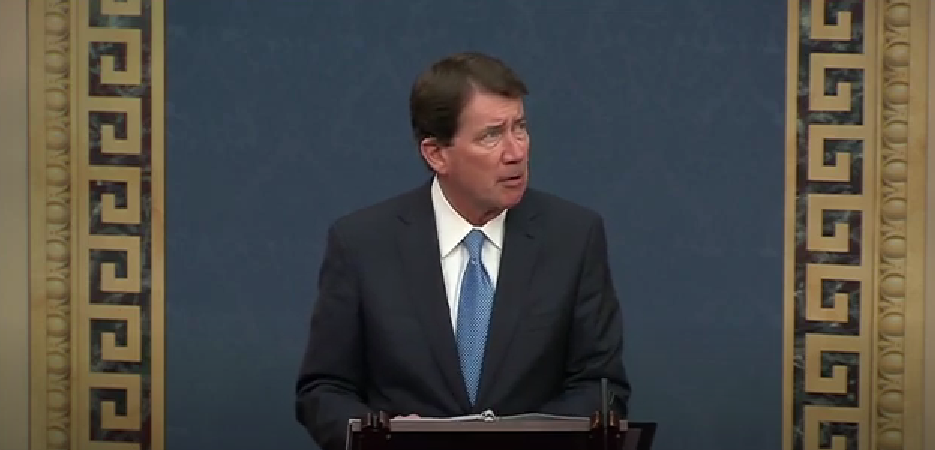Ending Title 42 invites more illegal immigration and drug-overdose deaths in midst of record crisis
WASHINGTON—United States Senator Bill Hagerty (R-TN) today—for the fourth time—sought to pass his “Stop Fentanyl Border Crossings Act,” legislation that would add large-scale drug smuggling as an additional basis for Title 42 expedited removal immigration authority, but Senator Bernie Sanders (I-VT) blocked the legislation, despite that Title 42 is scheduled to expire tomorrow.
Hagerty spoke on the Senate floor about the impending chaos that the expiration of Title 42 will bring to the collapsed southern border.
During the 117th Congress, Hagerty led his colleagues in introducing the Stop Fentanyl Border Crossings Act and sought to pass it on the Senate floor in April 2022, November 2022, and December 2022, but Senate Democrats blocked it all three times. Given the new urgency of tomorrow’s Title 42 expiration date, Hagerty once again urged the Senate to take this commonsense step to preserve this authority. More than 100,000 Americans are dying from drug overdoses each year—most from synthetic opioids like fentanyl coming across the southern border. Yet, Senate Democrats still refused to allow the bill’s passage.

Senator Hagerty’s remarks and the debate exchange may be found here. Text of his remarks is below.
Senator Hagerty: Mr. President, Title 42 will terminate tomorrow with the expiration of the COVID-19 public health emergency. Title 42 is one of the last tools available to Border Patrol agents, and the President is surrendering it during a record-shattering border crisis. It is unconscionable for Congress to stand aside and do nothing to preserve this critical authority.
Title 42 authority was initially based on the pandemic. And while I agree that the pandemic is over, the border crisis is worse than ever. Whether to keep effective border security policies in place should not depend on the pandemic.
There is a new epidemic plaguing our nation—one that demands immediate action. Deadly fentanyl—produced with the help of the Chinese Communist Party and smuggled across our southern border by drug cartels—has flooded our communities.
More than 100,000 Americans died of drug overdoses in the last 12 months alone—most from synthetic opioids like fentanyl.
It is the number-one cause of death for American adults ages 18 to 45.
The rise in fentanyl overdose deaths affects every state and congressional district. It kills the young and old, rich and poor, in cities and in small towns alike. It’s not a partisan issue, and finding a solution shouldn’t be either.
With the end of Title 42, even the Biden Administration is openly preparing for an already-record-breaking crisis to get far worse by sending 1,500 active duty troops to the southern border—it’s an admission of the impending invasion.
To allow Title 42 to end, without creating a permanent new authority to replace it, only empowers drug cartels. It enables them to send migrants across the border at strategic points, bogging down Border Patrol agents with paperwork and processing that takes five times longer without Title 42. This dramatic increase in processing times will significantly decrease scarce resources available to actually patrol our southern border.
Cartels will then use the longer and more frequent enforcement gaps to move more fentanyl across our border. We cannot allow that to happen.
Title 42 is an effective and important tool for controlling the flow of illegal migration at the southern border, but it is also an effective and important tool for dissuading migrants from making the dangerous journey to the southern border to ultimately be exploited by drug cartels.
But the current administration has no interest in dissuading migrants from coming to the United States. Instead, through Biden’s border policies, they entice thousands more migrants per day to illegally cross into the United States, risking their lives and magnify the humanitarian crisis.
That’s why I’ve introduced legislation to add drug smuggling as an additional basis for invoking Title 42 authority. It’s called the “Stop Fentanyl Border Crossings Act.” Overdoses have become an epidemic in America—no one can deny that. My legislation would allow the Secretary of Health and Human Services to use Title 42 to combat substantial, dangerous drug trafficking across the border. This bill would give Border Patrol a necessary tool to focus on stopping drug traffickers.
It seems like an obvious step to take—everyone agrees fentanyl trafficking is a dire problem. Yet, in the last Congress, Democrats blocked this legislation three times.
Now that Title 42 is actually coming to an end, it’s time to get past the political posturing, and I hope my colleagues will join me. We cannot sit idly by.
Without this authority, the record-breaking border crisis—and the deadly drug-overdose crisis that it fuels—will become unimaginably worse.
***
The motion was objected to by Sanders, who opposed providing this executive authority to save Americans from an impending invasion of illegal immigrants and fentanyl being trafficked across the southern border.
***
Senator Hagerty: Mr. President, my Democratic colleague is objecting to legislation that simply gives the Secretary of Health and Human Services the authority to limit border crossings when necessary to combat substantial, dangerous illicit drug smuggling.
It doesn’t provide authority to stop all asylum claims. It only applies where substantial illicit drug smuggling is endangering public health. More than 100,000 Americans are dying annually of drug overdoses—many of which result from drug smuggling at the southern border.
The legislation isn’t a mandate. It is a tool to help save American lives where that is possible.
Everyone acknowledges that an already-record-breaking crisis will get far worse without Title 42. American lives and communities hang in the balance.
Yet, my colleagues across the aisle are categorically opposed to a commonsense policy to address this glaring problem.
I yield the floor.
###